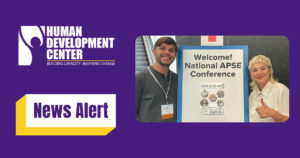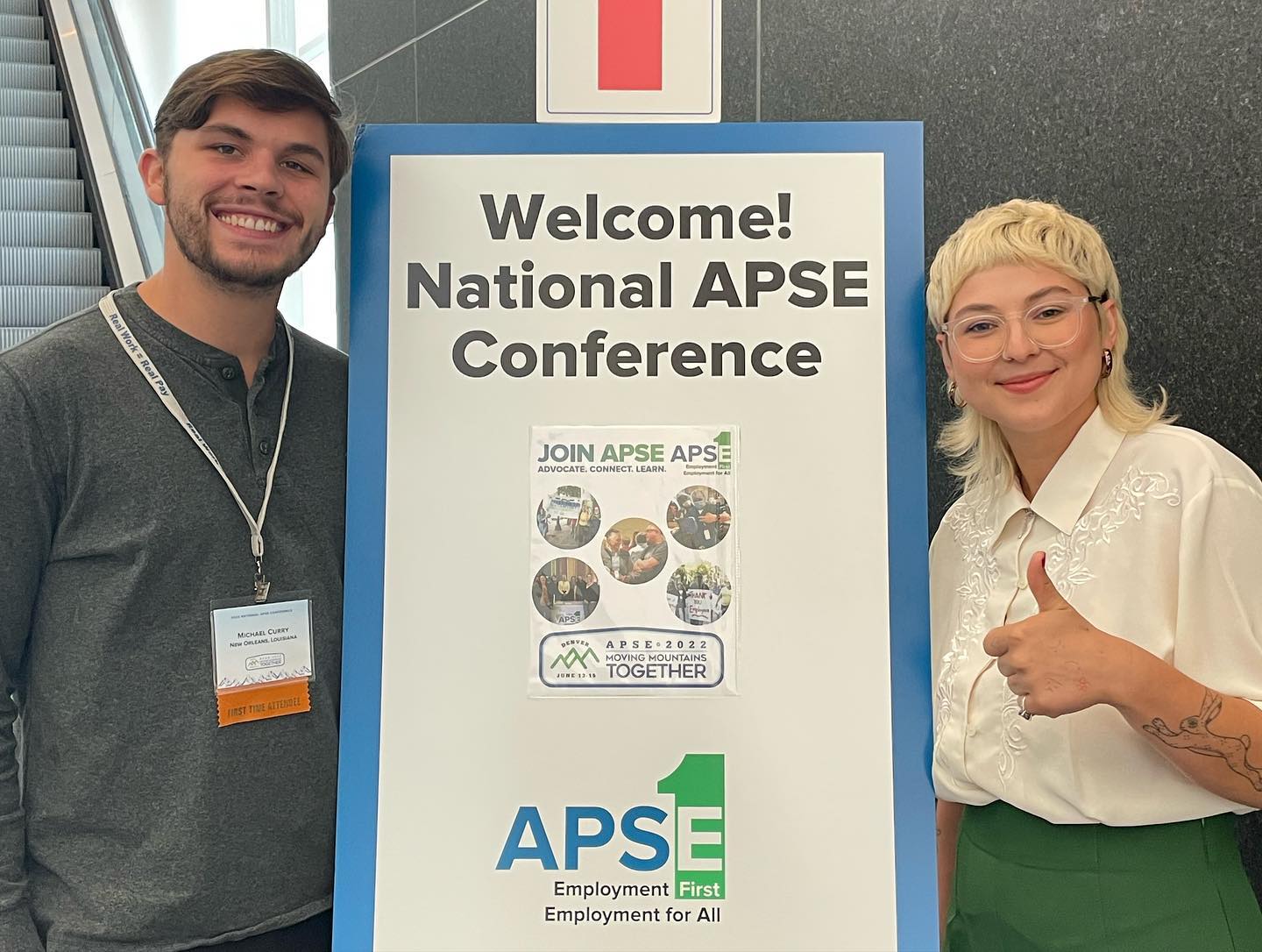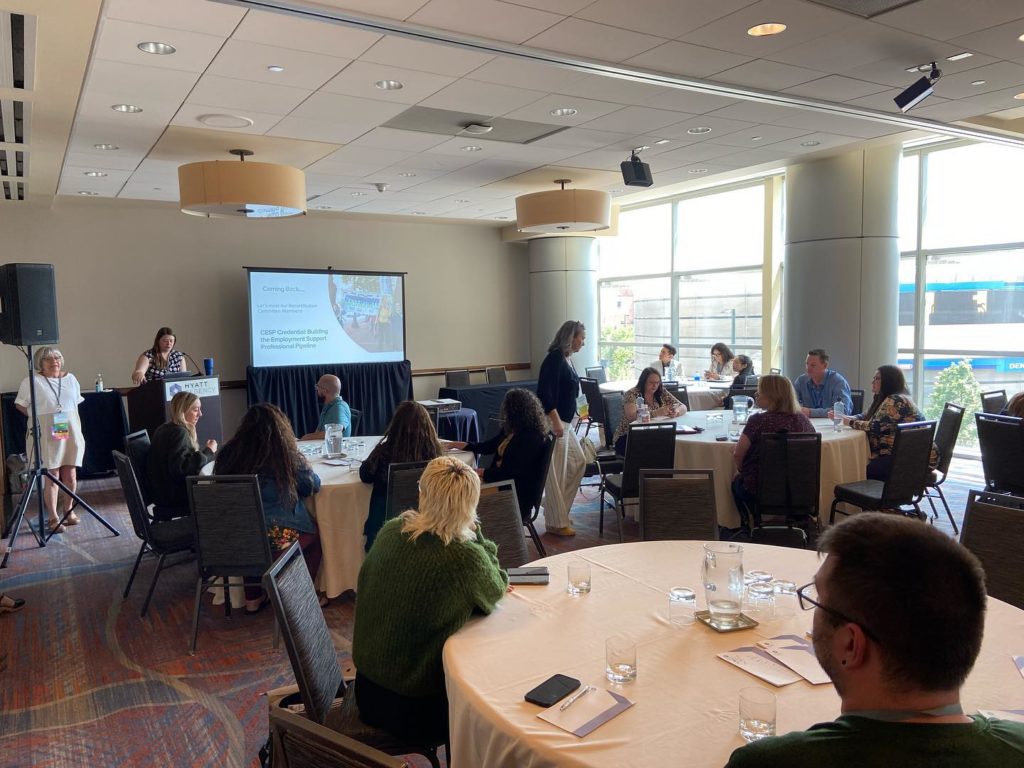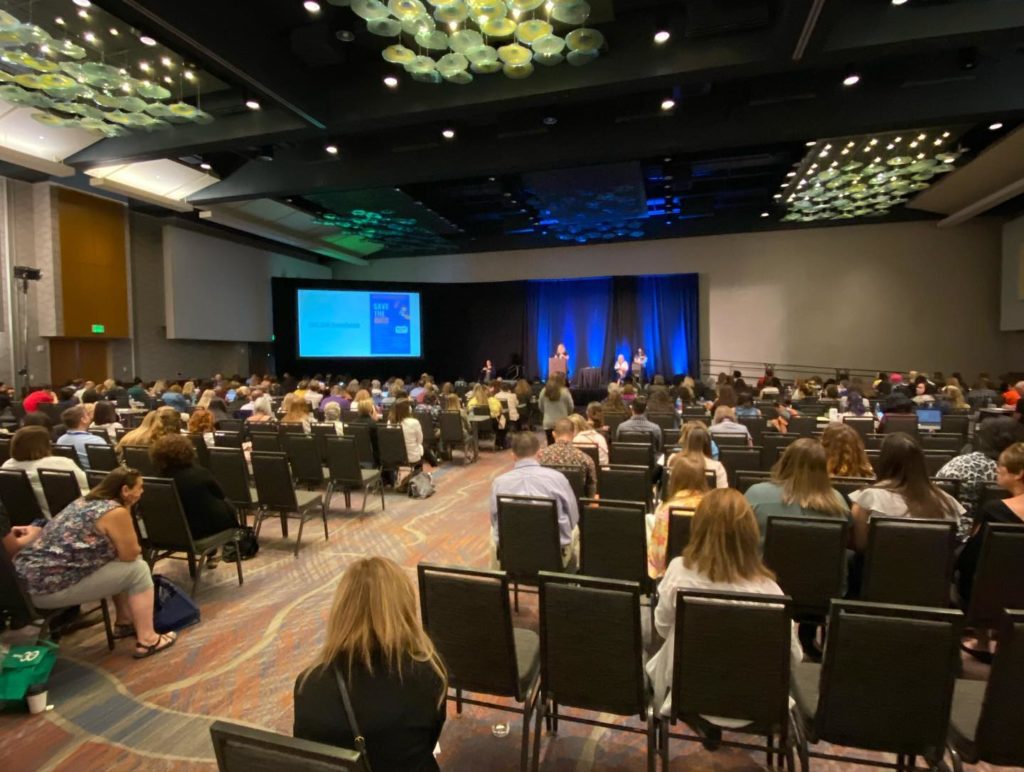HDC attends 2022 National APSE Conference


The Association of People Supporting Employment First (APSE) is the only national membership organization focused exclusively on Employment First to facilitate the full inclusion of people with disabilities in the workplace and community. APSE members recognize that everyone has abilities to contribute and their work should be recognized and rewarded with fair pay, creating inclusive workplaces. Employment enriches and adds meaning to every life, and workplaces and communities are enhanced when they embrace differences.
HDC staff from the PAY Check program and Employment First Trainings were able to attend the conference! Here is what they had to say:
Q: What was your favorite session at APSE and why?
Laura Stazio, Employment First Lead Trainer: My favorite session at APSE was the APSE Chapter Leaders’ Summit where I was able to meet in person with APSE leaders and members from other states. The meeting split into regions. Our region includes Louisiana, Arkansas, Utah, Oklahoma, Colorado, and Texas. There were some familiar faces of members that I had previously met at APSE conferences but it was great to meet in person with others whom I had never met or only met virtually through zoom. As we introduced ourselves, we shared the state of Employment First initiatives in our own states. I was inspired by the innovations of such states as Colorado and Utah. For example, both Colorado and Utah have been able to pass Employment First legislation, and Colorado has implemented a statewide partnership and Office of Employment First to promote competitive integrated employment.
Michael Curry, PAY Check Transition Specialist: My favorite session was the session with keynote speaker Emily Ladau, a disability rights activist with a disability. She gave great insight on how to promote self-determination and how to respect individuals with disabilities in their own personal journey. She noted language of choice for people with disabilities, what is helpful and harmful to promoting people with disabilities, and answered many questions people had about how to get people with disabilities’ voice heard.
Brenna Nopenz, PAY Check Transition Specialist: My favorite APSE session was “Incorporating Employment First in Transition Through Work-Based Learning Experiences in Underserved Populations.” The folks leading this session were from Arizona. They discussed the many ways they have overcome the challenges of serving students in rural areas and students living on reservations. They have developed success in reaching these students (who also may not have access to transportation) by utilizing virtual options for Pre-ETS and employment. They were inventive and very hands-on with their approach, and it was a pleasure to hear about their program.

Q: What is one thing you learned at the conference that you aim to use in your program?
Laura Stazio, Employment First Lead Trainer: There were several sessions concentrating on Customized Employment where I was able to learn how different states have implemented both the funding and delivery of Customized Employment training. Hopefully, some of these ideas will be able to translate to the Customized Employment training that HDC intends to offer in collaboration with Louisiana Rehabilitation Services (LRS).
Michael Curry, PAY Check Transition Specialist: I aim to use what I learned in “Business practices that lead to hiring and retention of workers with disabilities.” This gave everyone great insight into what an employer wants and expects when it comes to job development and accommodations for internships acquired through a business. The presenter, a hotel manager over 12 Hilton hotels, talked about his experience with Project SEARCH and what led to the success of those employees. It was informative and applicable to our everyday job.
Brenna Nopenz, PAY Check Transition Specialist: I want to make Pre-ETS more engaging for PAY Check participants. In one APSE session, the presenters shared wonderful role-playing activities to use to really get a student ready for employment. I’ll definitely be incorporating those in my work!

Q: Final thoughts?
Laura Stazio, Employment First Lead Trainer: I also attended a session on public policy and wanted to share some good news for Employment First! The number of people with disabilities earning subminimum wages through 14(c) certificates has been steadily decreasing over the last several years. At least twelve states have enacted or are in the process on enacting legislation to eliminate its use. I highly encourage visiting the APSE website for information about this and other Employment First Public Policy Priorities here: https://apse.org/legislative-advocacy/public-policy-priorities/
Michael Curry, PAY Check Transition Specialist: An APSE exhibitor created a web service called SourceAbled that helps people with disabilities find jobs. Like the site Indeed, this exhibitor matches employers with employees with disabilities. They scout companies that want to hire individuals with disabilities, they vet each company, and then they serve as a liaison between the company and the individual job seeker. The exhibitor also offers interview training with transition professionals that allows for interviewees to interview in a way that works for them and best suits their strengths. Individuals can apply directly on the website and then meet with people from the organization to guide them on the path to employment. Amazing service and I hope that is something that we can use here in the future!
About Laura Stazio, MS, CESP
Laura Stazio is a Certified Employment Support Professional. She has been working at HDC since 2012 on Employment Initiatives to increase the capacity of Supported Employment Agencies in Louisiana through training and mentoring. At HDC, she also works on Web and Graphics Design, and is the Data Coordinator for the National Information Reporting System (NIRS). She is currently the President of the Louisiana Association for Persons Supporting Employment First (LA APSE).
About Michael Curry
Michael Curry is the Assistant Transition Specialist with the Human Development Center’s Northshore PAY Check Program. As an Assistant Transition Specialist, his goals are to teach young adults self-advocacy and work-related skills so that they may reach their full potential. Michael has several years of experience working with individuals with disabilities to gain independent-living skills at home and in the community. He is driven to bring individualized supports to youth seeking higher education and competitive employment. He takes pride in providing young adults with the tools necessary to be valued members of their community and have full participation in community life.
About Brenna Nopenz
Brenna Nopenz is a Transition and Employment Specialist with the Post-Secondary Apprenticeship for Youth (PAY Check). They have experience working in postsecondary vocational training as well as New Orleans high school special education programs. As a PAY Check Transition and Employment Specialist, Brenna provides quality job coaching and specialized, hands-on work training for each unique individual. Brenna aims to show young adults a path to meaningful employment and community involvement by teaching self-advocacy and self-determination.

 myLSUHSC
myLSUHSC